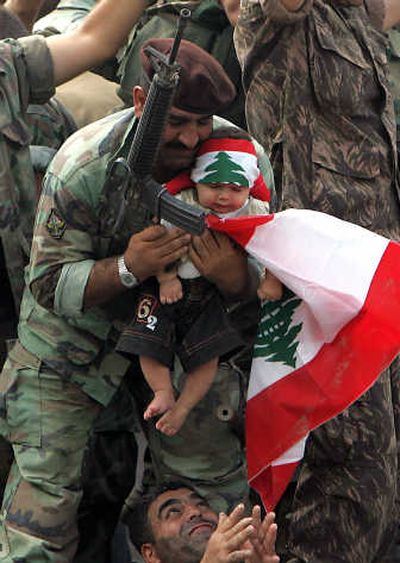Troops pursue militants

MOHAMMARA, Lebanon – Lebanese troops exchanged fire with fleeing militants Monday, killing four and capturing two as the military swept a Palestinian refugee camp and surrounding areas in northern Lebanon to try to capture the last holdouts after a ferocious battle.
The exchange marred the festive mood that engulfed the country after the army on Sunday crushed the al-Qaida-inspired Fatah Islam, killing 39, capturing 24 and ending a three-month siege that devastated the Nahr el-Bared refugee camp.
Six more bodies of Fatah Islam militants were retrieved from the battleground Monday, security officials said.
The army put its final death toll at 163, raising it by five more who died in Sunday’s last battle.
The army launched a volley of artillery fire for more than an hour in the afternoon, killing four militants and capturing two, said security officials speaking on condition of anonymity in accordance with government regulations.
Television reports said some fugitives opened fire and threw a hand grenade at a military patrol, injuring two soldiers.
Also Monday, soldiers on the ground, along with helicopters and speedboats in the Mediterranean Sea, searched neighborhoods, scorched bushes and coastal waters for an unknown number of militants who escaped the dragnet.
The camp remained off limits to the Palestinian refugees who had lived there and had fled Nahr el-Bared in the fighting’s early days on orders of the army. Inside the camp, military sappers combed destroyed neighborhoods, looking for booby traps, unexploded shells and mines.
The body of Fatah Islam leader Shaker al-Absi was identified by his wife at a hospital in the nearby port city of Tripoli, said Nasser Adra, the hospital’s director.
Al-Absi, a Palestinian linked to the late leader of al-Qaida in Iraq, Abu Musab al-Zarqawi, had not been seen or heard from since early in the fighting that started May 20.
A Jordanian military court sentenced al-Absi to death in absentia in 2004, along with al-Zarqawi, for their roles in the 2002 slaying of a U.S. diplomat in Amman. Al-Zarqawi was killed in a U.S. airstrike a year ago.
Sunday’s final battle between the army and Fatah Islam erupted as the militants attempted a three-pronged breakout from Nahr el-Bared but were soon locked in a fierce battle with troops, who took over the camp unopposed within hours. Lebanese civilians in nearby villages, armed with guns and sticks, fanned out to protect their houses.
Fatah Islam’s collapse brought an end to Lebanon’s worst internal fighting since the 1975-90 civil war. At least 20 civilians were also killed in the three-month battle.
Villagers, townspeople and troops celebrated in the streets, shooting in the air, waving Lebanese flags and flashing victory signs into the night.